2024年仁爱版九年级上册Unit 2 Saving the earth. Topic 1 Pollution has causes too many problems.课件(共23张PPT)
文档属性
| 名称 | 2024年仁爱版九年级上册Unit 2 Saving the earth. Topic 1 Pollution has causes too many problems.课件(共23张PPT) | 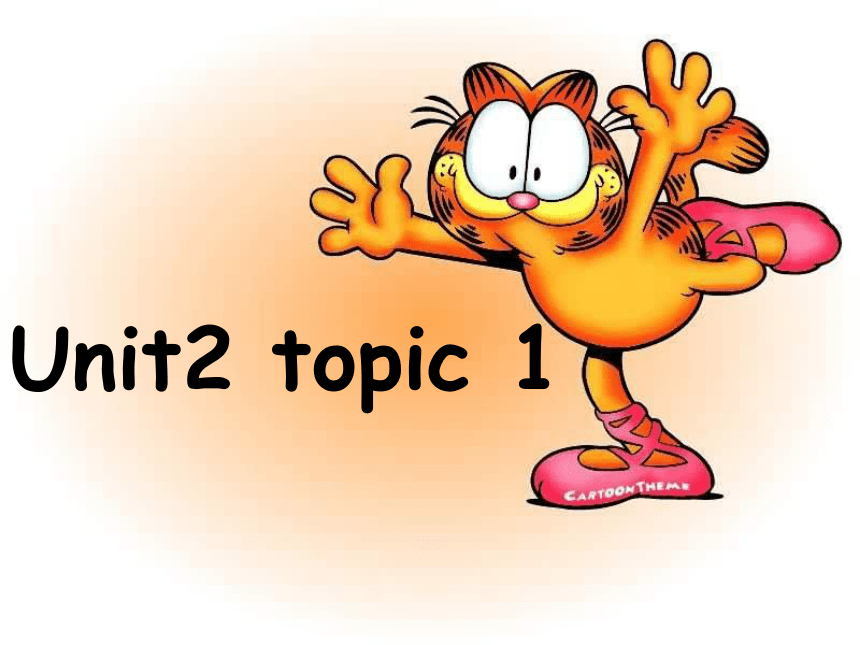 | |
| 格式 | pptx | ||
| 文件大小 | 237.8KB | ||
| 资源类型 | 教案 | ||
| 版本资源 | 仁爱科普版 | ||
| 科目 | 英语 | ||
| 更新时间 | 2024-03-30 20:53:16 | ||
图片预览

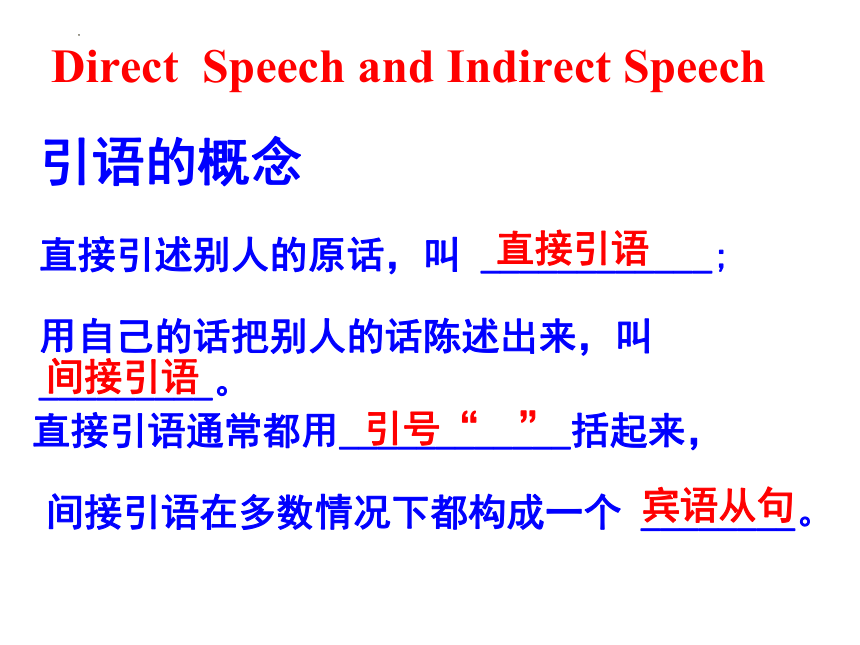
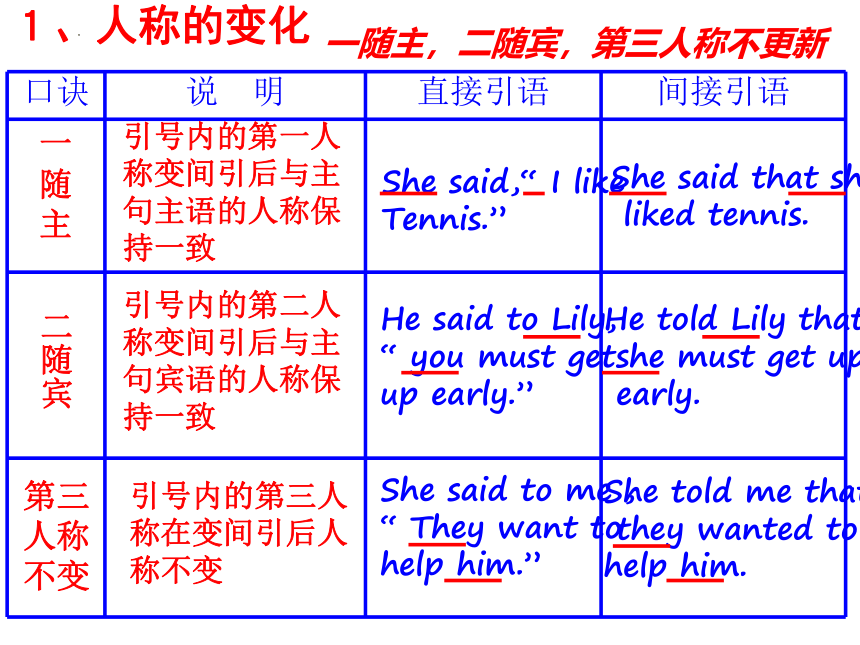

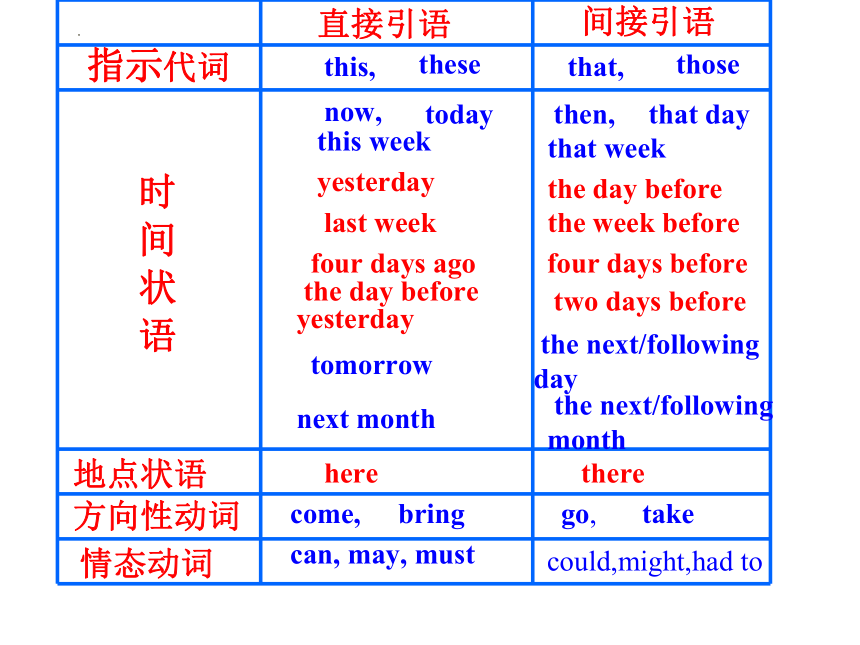
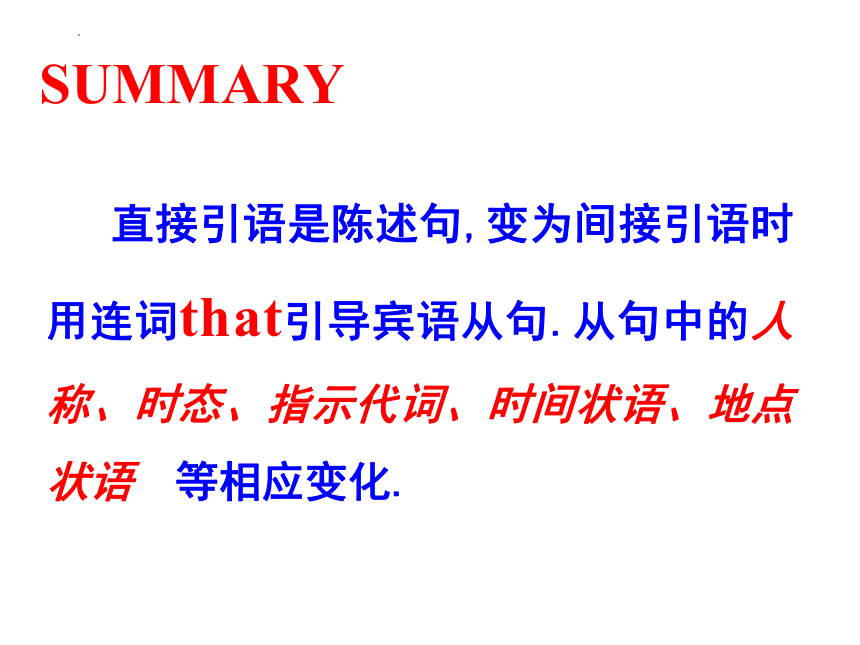

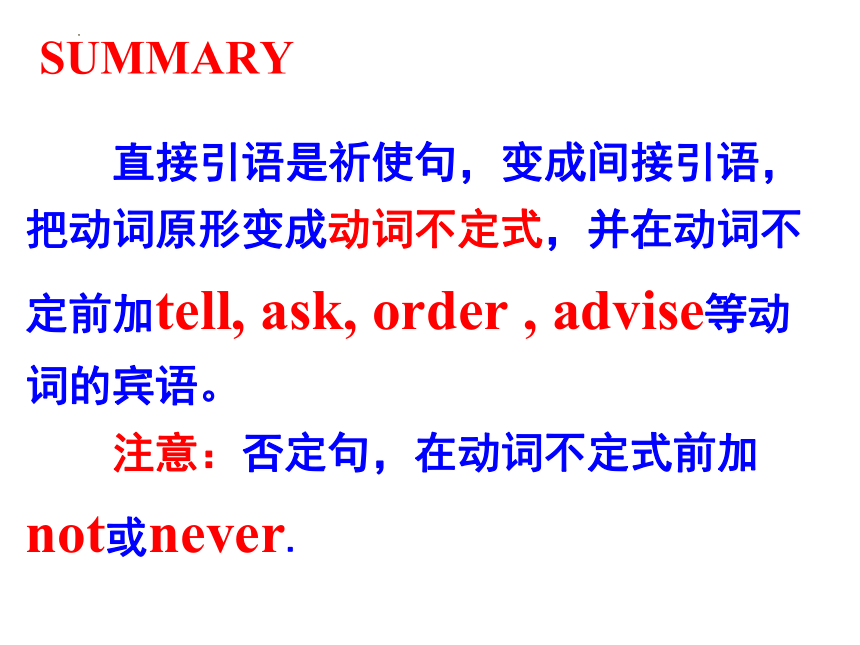
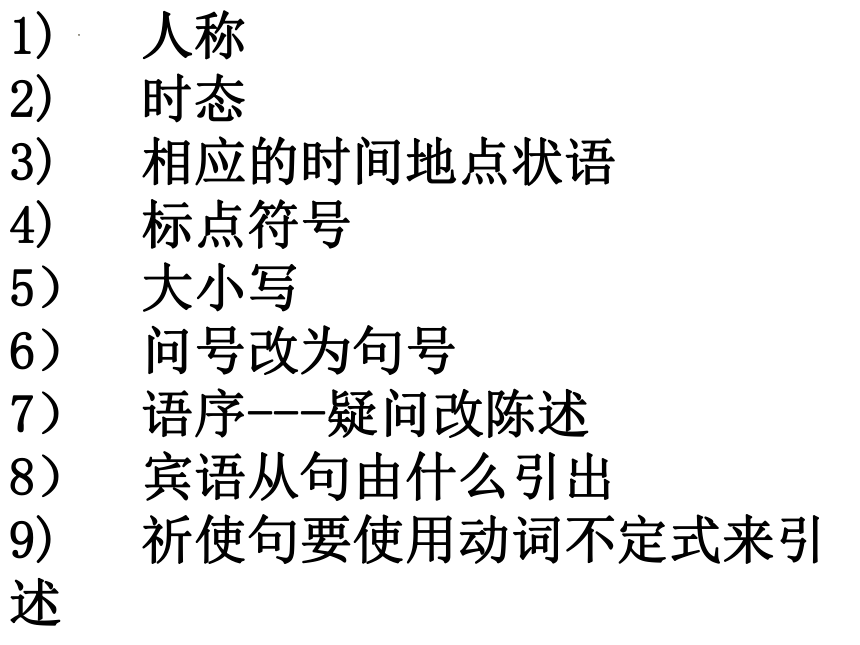
文档简介
(共23张PPT)
Unit2 topic 1
Direct Speech and Indirect Speech
引语的概念
直接引述别人的原话,叫 ____________;
直接引语
用自己的话把别人的话陈述出来,叫 _________。
间接引语
直接引语通常都用____________括起来,
引号“ ”
间接引语在多数情况下都构成一个 ________。
宾语从句
1、人称的变化
口诀 说 明 直接引语 间接引语
一
随
主
二随宾
第三
人称
不变
引号内的第一人
称变间引后与主
句主语的人称保
持一致
引号内的第二人
称变间引后与主
句宾语的人称保
持一致
引号内的第三人
称在变间引后人
称不变
She said,“ I like
Tennis.”
She said that she
liked tennis.
He said to Lily,
“ you must get
up early.”
He told Lily that
she must get up
early.
She said to me ,
“ They want to
help him.”
She told me that
they wanted to
help him.
一随主,二随宾,第三人称不更新
直接引语
间接引语
一般现在时
一般过去时
现在进行时
过去进行时
一般过去时
过去完成时
现在完成时
过去完成时
一般将来时
过去将来时
The teacher said,“The sun is bigger than the earth.”老师说太阳比地球大。
The teacher said that the sun is bigger than the earth.
注: 直引若是客观真理,变为间引时,时态不变.
时态变化
2
直接引语
间接引语
指示代词
时 间 状 语
地点状语
方向性动词
this,
that,
these
those
now,
then,
today
that day
this week
that week
yesterday
the day before
last week
the week before
four days ago
four days before
the day before yesterday
two days before
tomorrow
the next/following day
next month
the next/following month
here
there
come,
go,
bring
take
情态动词
can, may, must
could,might,had to
SUMMARY
直接引语是陈述句,变为间接引语时用连词that引导宾语从句.从句中的人称、时态、指示代词、时间状语、地点状语 等相应变化.
SUMMARY
直接引语是疑问句,变间接引语时,要从疑问语序变为陈述语序。
直接引语是一般疑问句,变为间接引语时,用连词 if 或 whether 连接。
直接引语是特殊疑问句,变为间接引语时,仍用原来的疑问词作连词来引导。
直接引语是祈使句,变成间接引语,把动词原形变成动词不定式,并在动词不定前加tell, ask, order , advise等动词的宾语。
注意:否定句,在动词不定式前加not或never.
SUMMARY
1) 人称
2) 时态
3) 相应的时间地点状语
4) 标点符号
5) 大小写
6) 问号改为句号
7) 语序---疑问改陈述
8) 宾语从句由什么引出
9) 祈使句要使用动词不定式来引述
练习直接引语和间接引语的相互转换。
1. “I often play the piano.” Tina said.
Tina said___________________________.
2. “Did you write to your friends yesterday ” he
asked me.
He asked me________________________
___________________________________.
3. “Where shall we meet ” Lucy asked.
Lucy asked _________________________.
4. “Don’t disturb me.” he said to his brother.
__________________________________.
5. Mary asked me if I was reading books.
“____________________” Mary asked me.
that she often played the piano
if/whether I had written to
may friends the day before
where they would meet
He told his brother not to disturb him
Are you reading books
词组复习
计划一次野炊
看见蜜蜂和蝴蝶飞舞
听起来不错
有某人或某物正在做
往小溪里排污水
plan a picnic
see bees and butterflies dancing
There be sth./ sb. doing sth.
Sounds great!
pour waste water into the stream
词组复习
一切都变样了
把…倒入
对….有害
空气/水污染
影响我们的环境
采取措施做某事
Everything has changed.
pour…into ….
do (great) harm to …
air/ water pollution
be harmful to ….
influence our environment
do something useful to do sth.
词组复习
看起来很虚弱
我呼吸困难
你像这样多久了
化工厂排房难闻的气体
look weak
It’s difficult for me to breathe.
How long have you been like this
The chemical factory produces terrible gas.
词组复习
制造太多噪音
深呼吸
心情不好
不能容忍某事
解决问题
写信给某人
make too much noise
take a deep breath
=breathe deeply
can’t stand sth/ doing sth.
be in a bad mood
solve the problem
write to sb.
词组复习
甚至更糟
不是所有的
容易变聋
许多大量
丧失听力
据报道
和…几乎一样坏
even worse
not all
go deaf easily
hearing loss
quite a few=many
It is reported that …
no better than
用所给词的适当形式填空。
It was _______(report) that Liu Xiang would take part in the next Olympics.
Look! There is a little boy ________(play) soccer on the playground.
Noise pollution can cause people
_________(become) sick or deaf.
4. It’s a pity that such a beautiful lake
____________ (go).
5. People who work and live in _______(noise) conditions may go deaf.
reported
playing
to become
have gone
noisy
词组复习
各种
对某事(没)有影响
对..有害
以多种方式
导致眼睛痛
呼吸问题
我的天啊
all sorts of
have an (no) effect on sth.
be bad for
cause sore eyes
in many ways
breathing problems
Oh, my goodness!
词组复习
随着人口的增长和工业的发展
毁坏土壤
丧失听力
高血压
让我们成为环保者
With the increase in population and the development of industry
lose one’s hearing
destroy the soil
high blood pressure
Let’s be greener people.
情景交际
Mary: Excuse me. _ 1_
I haven’t seen him for weeks.
Bill: Jim’s gone to England.
Mary: Really _2_
Bill: He went there last week.
Mary: _3_
Bill: For three times.
Mary: _4_
Bill: He traveled with his friends.
Mary: _5_
Bill: He will be away for about two weeks.
Mary: Oh, thank you. I’ll phone him this evening.
Where’s Jim Where has Jim gone
When did he go there
How many times has he been there
Whom/Who did he travel with
How long will he be away
( )1.—How long _____ you _____ here
—For about two years so far.
A.have; studied B.did; live
C.do; stay D.were; swimming
( )2.We have known each other _____ ten years ago.
A.for B.ever
C.about D.since
( )3.There is _____ pollution in the world. We must stop it.
A.much too B.too much
C.many too D.too many
★
★
★
( )4.—Is the flower beautiful
—Yes, at _____ it’s _____ the one you bought for me.
A.last; as bad as
B.least; no better than
C.last; not better
D.least; no worse than
( )5.I can’t stand _____ for you so long.
A.to wait B.waiting
C.waits D.waited
★
★
( )6.The boss made child laborers _____ 12 hours every day.
A.working B.works
C.work D.to work
( )7._____ the environment is important for human beings.
A.Take care of B.Taking care of
C.Took care of D.Take the care of
★
★
( )8.—Have you finished your homework
—Not _____. There are still some exercises to be done.
A.already B.yet
C.just D.ever
( )9.—It smells terrible. What has happened here
—Look, there is much waste gas _____ from the chemical factory.
A.pour B.pouring C.poured D.pours
( )10.When I was walking in the street yesterday, I saw a UFO _____ over my head.
A.flying B.flies
C.flew D.to fly
★
★
★
Unit2 topic 1
Direct Speech and Indirect Speech
引语的概念
直接引述别人的原话,叫 ____________;
直接引语
用自己的话把别人的话陈述出来,叫 _________。
间接引语
直接引语通常都用____________括起来,
引号“ ”
间接引语在多数情况下都构成一个 ________。
宾语从句
1、人称的变化
口诀 说 明 直接引语 间接引语
一
随
主
二随宾
第三
人称
不变
引号内的第一人
称变间引后与主
句主语的人称保
持一致
引号内的第二人
称变间引后与主
句宾语的人称保
持一致
引号内的第三人
称在变间引后人
称不变
She said,“ I like
Tennis.”
She said that she
liked tennis.
He said to Lily,
“ you must get
up early.”
He told Lily that
she must get up
early.
She said to me ,
“ They want to
help him.”
She told me that
they wanted to
help him.
一随主,二随宾,第三人称不更新
直接引语
间接引语
一般现在时
一般过去时
现在进行时
过去进行时
一般过去时
过去完成时
现在完成时
过去完成时
一般将来时
过去将来时
The teacher said,“The sun is bigger than the earth.”老师说太阳比地球大。
The teacher said that the sun is bigger than the earth.
注: 直引若是客观真理,变为间引时,时态不变.
时态变化
2
直接引语
间接引语
指示代词
时 间 状 语
地点状语
方向性动词
this,
that,
these
those
now,
then,
today
that day
this week
that week
yesterday
the day before
last week
the week before
four days ago
four days before
the day before yesterday
two days before
tomorrow
the next/following day
next month
the next/following month
here
there
come,
go,
bring
take
情态动词
can, may, must
could,might,had to
SUMMARY
直接引语是陈述句,变为间接引语时用连词that引导宾语从句.从句中的人称、时态、指示代词、时间状语、地点状语 等相应变化.
SUMMARY
直接引语是疑问句,变间接引语时,要从疑问语序变为陈述语序。
直接引语是一般疑问句,变为间接引语时,用连词 if 或 whether 连接。
直接引语是特殊疑问句,变为间接引语时,仍用原来的疑问词作连词来引导。
直接引语是祈使句,变成间接引语,把动词原形变成动词不定式,并在动词不定前加tell, ask, order , advise等动词的宾语。
注意:否定句,在动词不定式前加not或never.
SUMMARY
1) 人称
2) 时态
3) 相应的时间地点状语
4) 标点符号
5) 大小写
6) 问号改为句号
7) 语序---疑问改陈述
8) 宾语从句由什么引出
9) 祈使句要使用动词不定式来引述
练习直接引语和间接引语的相互转换。
1. “I often play the piano.” Tina said.
Tina said___________________________.
2. “Did you write to your friends yesterday ” he
asked me.
He asked me________________________
___________________________________.
3. “Where shall we meet ” Lucy asked.
Lucy asked _________________________.
4. “Don’t disturb me.” he said to his brother.
__________________________________.
5. Mary asked me if I was reading books.
“____________________” Mary asked me.
that she often played the piano
if/whether I had written to
may friends the day before
where they would meet
He told his brother not to disturb him
Are you reading books
词组复习
计划一次野炊
看见蜜蜂和蝴蝶飞舞
听起来不错
有某人或某物正在做
往小溪里排污水
plan a picnic
see bees and butterflies dancing
There be sth./ sb. doing sth.
Sounds great!
pour waste water into the stream
词组复习
一切都变样了
把…倒入
对….有害
空气/水污染
影响我们的环境
采取措施做某事
Everything has changed.
pour…into ….
do (great) harm to …
air/ water pollution
be harmful to ….
influence our environment
do something useful to do sth.
词组复习
看起来很虚弱
我呼吸困难
你像这样多久了
化工厂排房难闻的气体
look weak
It’s difficult for me to breathe.
How long have you been like this
The chemical factory produces terrible gas.
词组复习
制造太多噪音
深呼吸
心情不好
不能容忍某事
解决问题
写信给某人
make too much noise
take a deep breath
=breathe deeply
can’t stand sth/ doing sth.
be in a bad mood
solve the problem
write to sb.
词组复习
甚至更糟
不是所有的
容易变聋
许多大量
丧失听力
据报道
和…几乎一样坏
even worse
not all
go deaf easily
hearing loss
quite a few=many
It is reported that …
no better than
用所给词的适当形式填空。
It was _______(report) that Liu Xiang would take part in the next Olympics.
Look! There is a little boy ________(play) soccer on the playground.
Noise pollution can cause people
_________(become) sick or deaf.
4. It’s a pity that such a beautiful lake
____________ (go).
5. People who work and live in _______(noise) conditions may go deaf.
reported
playing
to become
have gone
noisy
词组复习
各种
对某事(没)有影响
对..有害
以多种方式
导致眼睛痛
呼吸问题
我的天啊
all sorts of
have an (no) effect on sth.
be bad for
cause sore eyes
in many ways
breathing problems
Oh, my goodness!
词组复习
随着人口的增长和工业的发展
毁坏土壤
丧失听力
高血压
让我们成为环保者
With the increase in population and the development of industry
lose one’s hearing
destroy the soil
high blood pressure
Let’s be greener people.
情景交际
Mary: Excuse me. _ 1_
I haven’t seen him for weeks.
Bill: Jim’s gone to England.
Mary: Really _2_
Bill: He went there last week.
Mary: _3_
Bill: For three times.
Mary: _4_
Bill: He traveled with his friends.
Mary: _5_
Bill: He will be away for about two weeks.
Mary: Oh, thank you. I’ll phone him this evening.
Where’s Jim Where has Jim gone
When did he go there
How many times has he been there
Whom/Who did he travel with
How long will he be away
( )1.—How long _____ you _____ here
—For about two years so far.
A.have; studied B.did; live
C.do; stay D.were; swimming
( )2.We have known each other _____ ten years ago.
A.for B.ever
C.about D.since
( )3.There is _____ pollution in the world. We must stop it.
A.much too B.too much
C.many too D.too many
★
★
★
( )4.—Is the flower beautiful
—Yes, at _____ it’s _____ the one you bought for me.
A.last; as bad as
B.least; no better than
C.last; not better
D.least; no worse than
( )5.I can’t stand _____ for you so long.
A.to wait B.waiting
C.waits D.waited
★
★
( )6.The boss made child laborers _____ 12 hours every day.
A.working B.works
C.work D.to work
( )7._____ the environment is important for human beings.
A.Take care of B.Taking care of
C.Took care of D.Take the care of
★
★
( )8.—Have you finished your homework
—Not _____. There are still some exercises to be done.
A.already B.yet
C.just D.ever
( )9.—It smells terrible. What has happened here
—Look, there is much waste gas _____ from the chemical factory.
A.pour B.pouring C.poured D.pours
( )10.When I was walking in the street yesterday, I saw a UFO _____ over my head.
A.flying B.flies
C.flew D.to fly
★
★
★
同课章节目录
- Unit 1 The Changing World
- Topic 1 Our country has developed rapidly.
- Topic 2 The population in developing countries is
- Topic 3 The world has changed for the better.
- Unit 2 Saving the earth.
- Topic 1 Pollution has causes too many problems.
- Topic 2 All these problems are very serious.
- Topic 3 What can we do to protect the environment
- Unit 3 English around the World
- Topic 1 English is widely spoken around the world.
- Topic 2 Some things usually have different meaning
- Topic 3 Could you give us some advice on how to l
- Unit 4 Amazing Science
- Topic 1 When was it invented?
- Topic 2 I'm excited about the things that will be
- Topic 3 China is the third nation that sent a pers
